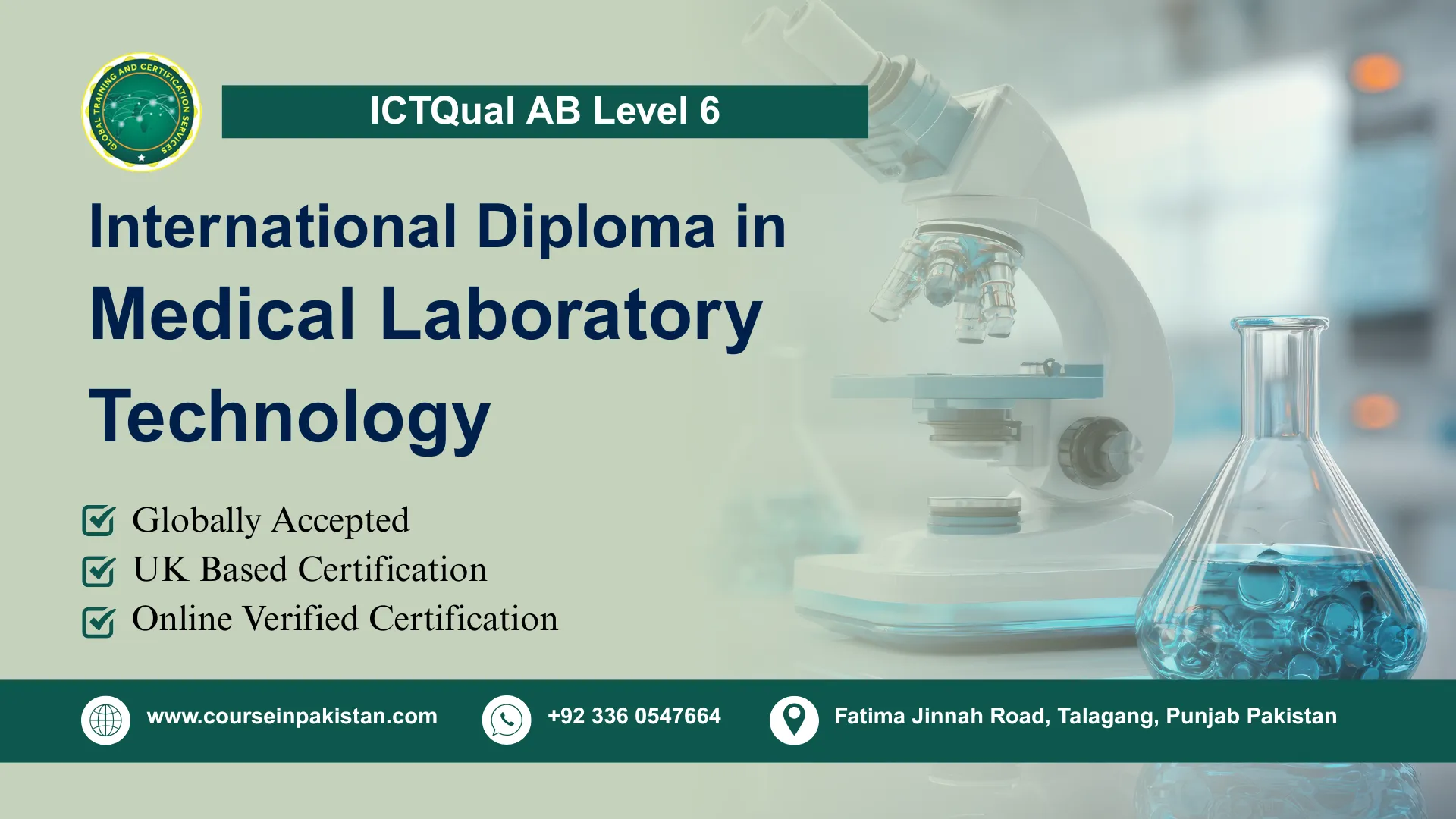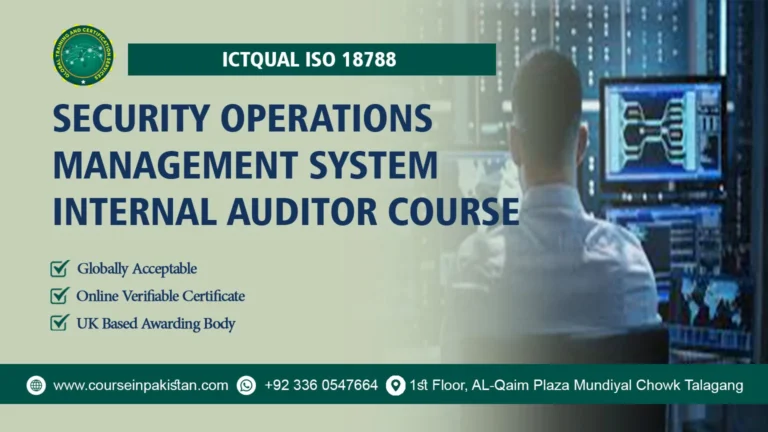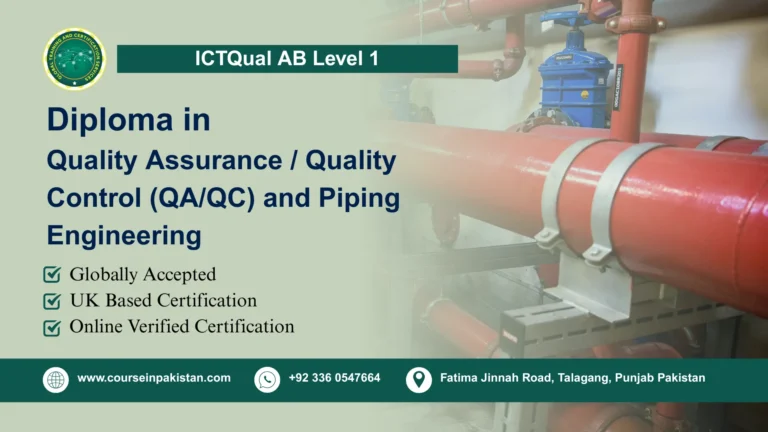
This diploma also emphasizes professional development, critical thinking, and research skills in laboratory medicine. Graduates will be equipped to perform accurate diagnostic testing, interpret laboratory results, and maintain quality assurance standards in clinical and research laboratories. The program is ideal for individuals aiming for careers in hospitals, diagnostic centers, research institutions, and healthcare laboratories, ensuring global employability and professional recognition in the field of medical laboratory technology.
The ICTQual AB Level 6 International Diploma in Medical Laboratory Technology is designed for aspiring medical laboratory professionals who wish to develop advanced knowledge and practical skills in laboratory diagnostics, clinical analysis, and laboratory management. This comprehensive program covers key areas such as hematology, microbiology, biochemistry, molecular diagnostics, and laboratory safety. Learners will gain hands-on experience in modern laboratory techniques, instrumentation, and quality control, preparing them to contribute effectively to healthcare diagnostics and patient care.
Course Overview
The ICTQual AB Level 6 International Diploma in Medical Laboratory Technology is a 360-credit, fully assignment-based qualification that allows learners to study at their own pace from anywhere in the world. This internationally recognized certification is British Council verifiable, MOFA and Embassy attestable, making it ideal for employment opportunities and Iqama approval. The program provides in-depth knowledge and practical skills in medical laboratory science, clinical diagnostics, molecular biology, hematology, microbiology, and laboratory management, preparing learners for professional roles in hospitals, research laboratories, and healthcare facilities globally.
Fresh students are required to complete all 36 mandatory assignments within three years, gaining comprehensive theoretical knowledge alongside hands-on laboratory expertise. Experienced professionals can pursue this certification by submitting verifiable six years of relevant experience and demonstrating their expertise in professional discussion meetings with an ICTQual AB approved assessor, enabling them to achieve the qualification in a shorter period without completing all assignments. This flexible, assignment-based structure ensures accessibility for learners at all stages, while providing a globally recognized credential that enhances career prospects, professional credibility, and opportunities in medical laboratory technology.
Key Highlights of the Course:
- Comprehensive training in hematology, microbiology, biochemistry, and molecular diagnostics
- Hands-on laboratory experience with modern equipment and diagnostic techniques
- Emphasis on laboratory safety, quality control, and regulatory compliance
- Development of research, data analysis, and clinical interpretation skills
- Prepare for professional roles in hospitals, diagnostic centers, and research laboratories
Course Benefits
Career Advancement
- Access to professional roles in clinical, hospital, and research laboratories
- Prepare for senior, specialist, and leadership positions in laboratory medicine
2. Practical Skill Development
- Gain hands-on experience in laboratory techniques, instrumentation, and diagnostic testing
- Apply laboratory knowledge to ensure accurate and reliable results
3. Industry-Recognized Qualification
- Internationally accredited and verifiable diploma
- Enhance employability in healthcare, diagnostic, and research sectors
4. Technical and Analytical Expertise
- Develop critical thinking, problem-solving, and analytical skills
- Interpret laboratory data for clinical decision-making and patient care
5. Contribution to Healthcare and Research
- Support accurate diagnostics and patient care initiatives
- Engage in research projects, quality assurance, and laboratory innovation
Course Study Units
This qualification, the ICTQual AB Level 6 International Diploma in Medical Laboratory Technology 360 Credits – Three Years, consists of 36 mandatory units.
Year 1: Foundation in Medical Laboratory Technology
- Fundamentals of Medical Laboratory Science
- Human Anatomy and Physiology
- General Biochemistry
- Principles of Microbiology
- Immunology and Serology
- Introduction to Pathology
- Basic Haematology
- Laboratory Safety and Quality Assurance
- Computer Applications in Laboratory Practice
- Communication Skills for Healthcare Professionals
- Medical Ethics and Professional Conduct
- Research Methods in Health Sciences
Year 2: Intermediate Laboratory Applications
- Clinical Biochemistry Techniques
- Advanced Microbiology
- Diagnostic Parasitology
- Molecular Biology Basics
- Blood Banking and Transfusion Science
- Clinical Haematology
- Histopathology Techniques
- Cytology and Cytogenetics
- Instrumentation and Analytical Methods
- Epidemiology and Public Health
- Environmental and Food Microbiology
- Clinical Laboratory Management
Year 3: Advanced Laboratory Specialisation
- Advanced Molecular Diagnostics
- Clinical Immunology
- Advanced Histopathology
- Clinical Virology
- Toxicology and Forensic Science
- Advanced Parasitology
- Automation in Medical Laboratories
- Advanced Transfusion Medicine
- Laboratory Data Analysis and Interpretation
- Emerging Diseases and Diagnostic Innovations
- Research Project / Dissertation
- Professional Practice and Internship
Learning Outcomes
Year 1 – Foundation in Medical Laboratory Technology
1. Fundamentals of Medical Laboratory Science
- Understand the principles, scope, and roles of medical laboratory technology
- Explain basic laboratory techniques and diagnostic procedures
- Apply foundational knowledge to support patient care and clinical testing
2. Human Anatomy and Physiology
- Describe the structure and function of human body systems
- Understand physiological processes relevant to laboratory diagnostics
- Apply anatomical and physiological knowledge to interpret lab results
3. General Biochemistry
- Understand biochemical principles and molecular processes in human health
- Apply biochemical knowledge to clinical laboratory testing
- Interpret biochemical data to support diagnostics and research
4. Principles of Microbiology
- Understand microorganisms and their role in health and disease
- Apply microbiological techniques for identification and analysis
- Implement infection control and laboratory safety practices
5. Immunology and Serology
- Understand immune system function and antibody-antigen interactions
- Apply serological techniques for disease detection and monitoring
- Interpret immunological test results for clinical applications
6. Introduction to Pathology
- Understand disease mechanisms and pathological processes
- Relate pathology concepts to laboratory diagnostics
- Apply basic pathological knowledge in clinical laboratory practice
7. Basic Haematology
- Perform fundamental hematological tests and blood analyses
- Interpret complete blood counts, differential counts, and blood smears
- Apply haematology knowledge to patient care and diagnostics
8. Laboratory Safety and Quality Assurance
- Implement health, safety, and hygiene protocols in laboratories
- Conduct quality control checks and ensure compliance with standards
- Minimize risk and maintain safe laboratory practices
9. Computer Applications in Laboratory Practice
- Use digital tools and software for laboratory data management
- Apply computational techniques for data recording and analysis
- Enhance efficiency and accuracy in laboratory workflows
10. Communication Skills for Healthcare Professionals
- Demonstrate effective communication with colleagues, patients, and healthcare teams
- Document laboratory findings clearly and professionally
- Apply interpersonal skills to support collaborative healthcare
11. Medical Ethics and Professional Conduct
- Understand ethical principles in medical laboratory practice
- Apply professional conduct and patient confidentiality standards
- Evaluate ethical dilemmas and make informed decisions
12. Research Methods in Health Sciences
- Understand research design, methodology, and ethics in health sciences
- Conduct literature reviews and critically analyze research data
- Apply research principles to laboratory studies and clinical projects
Year 2 – Intermediate Laboratory Applications
13. Clinical Biochemistry Techniques
- Perform biochemical assays and clinical laboratory tests accurately
- Interpret results for diagnosis, prognosis, and patient monitoring
- Apply quality control in biochemical laboratory testing
14. Advanced Microbiology
- Conduct advanced microbiological analyses and cultures
- Identify pathogenic microorganisms and interpret clinical significance
- Apply microbiology techniques to hospital and research laboratories
15. Diagnostic Parasitology
- Detect and identify parasites in clinical samples
- Understand life cycles and transmission of medically important parasites
- Apply laboratory techniques for parasitic disease diagnosis
16. Molecular Biology Basics
- Understand molecular biology concepts and DNA/RNA analysis
- Apply molecular techniques for diagnostics and research
- Interpret molecular data for clinical and laboratory applications
17. Blood Banking and Transfusion Science
- Understand principles of blood banking, transfusion, and immunohematology
- Perform compatibility testing and blood group typing
- Ensure safe transfusion practices and patient safety
18. Clinical Haematology
- Conduct advanced hematological testing and interpretation
- Analyze hematological disorders and blood-related diseases
- Apply hematology knowledge in clinical decision-making
19. Histopathology Techniques
- Prepare and analyze tissue samples for pathological examination
- Apply staining and microscopy techniques
- Interpret histological findings for diagnostics and research
20. Cytology and Cytogenetics
- Analyze cellular samples and chromosomal structures
- Identify abnormalities and genetic disorders
- Apply cytological and cytogenetic techniques in diagnostics
21. Instrumentation and Analytical Methods
- Operate laboratory instruments and analytical equipment effectively
- Apply quantitative and qualitative methods for laboratory testing
- Interpret data obtained from modern laboratory instrumentation
22. Epidemiology and Public Health
- Understand disease patterns and public health principles
- Apply epidemiological methods to laboratory surveillance
- Support public health initiatives through laboratory data
23. Environmental and Food Microbiology
- Analyze microbial content in environmental and food samples
- Apply microbiological techniques for safety and quality testing
- Interpret results to support public health and regulatory compliance
24. Clinical Laboratory Management
- Develop skills in laboratory administration, workflow, and team coordination
- Implement quality assurance and accreditation procedures
- Manage resources and ensure efficient laboratory operations
Year 3 – Advanced Laboratory Specialisation
25. Advanced Molecular Diagnostics
- Apply molecular techniques for disease detection and research
- Analyze genetic material and molecular markers accurately
- Interpret results for clinical and laboratory applications
26. Clinical Immunology
- Conduct advanced immunological testing and assays
- Understand immune disorders and therapeutic interventions
- Apply immunology knowledge in diagnostics and patient care
27. Advanced Histopathology
- Perform complex tissue analysis and staining techniques
- Interpret histopathological findings accurately for diagnosis
- Apply advanced techniques in clinical and research laboratories
28. Clinical Virology
- Identify and analyze viral pathogens in clinical samples
- Apply molecular and immunological methods in virology diagnostics
- Interpret results to support disease management and public health
29. Toxicology and Forensic Science
- Analyze biological and chemical samples for toxins and forensic purposes
- Apply toxicological principles to clinical and investigative scenarios
- Interpret data for patient safety and legal compliance
30. Advanced Parasitology
- Conduct detailed parasitological analyses and identification
- Understand complex parasite-host interactions
- Apply advanced diagnostic techniques in clinical and research labs
31. Automation in Medical Laboratories
- Operate automated laboratory systems and robotic instruments
- Integrate technology to improve efficiency and accuracy
- Ensure quality control in automated laboratory workflows
32. Advanced Transfusion Medicine
- Perform advanced blood compatibility testing and transfusion management
- Apply immunohematology principles in complex clinical cases
- Ensure adherence to transfusion safety protocols
33. Laboratory Data Analysis and Interpretation
- Analyze complex laboratory data using statistical and computational tools
- Interpret results accurately to support clinical decisions
- Apply data management strategies for laboratory quality and efficiency
34. Emerging Diseases and Diagnostic Innovations
- Understand new and emerging pathogens and diagnostic techniques
- Apply innovative methods for disease detection and surveillance
- Stay updated with technological advancements in laboratory medicine
35. Research Project / Dissertation
- Conduct independent laboratory-based research
- Apply scientific methodology to investigate clinical or diagnostic questions
- Present findings through structured reports and professional presentations
36. Professional Practice and Internship
- Demonstrate practical competence in real laboratory environments
- Apply theoretical knowledge to clinical diagnostics under supervision
- Evaluate performance and integrate feedback for professional development
Who is This Course For?
The ideal learner for this course is someone who:
- Has a strong interest in laboratory diagnostics, clinical analysis, and healthcare science
- Seeks to develop practical skills in modern laboratory techniques and instrumentation
- Desires a career in hospital, clinical, research, or public health laboratories
- Wants to gain expertise in molecular diagnostics, hematology, microbiology, and biochemistry
- Is motivated to uphold quality standards, laboratory safety, and professional ethics
Future Progression
Graduates of this course can pursue:
- Senior and specialist roles in hospital, diagnostic, and research laboratories
- Careers as Clinical Laboratory Scientists, Medical Laboratory Technologists, or Laboratory Managers
- Opportunities in molecular diagnostics, transfusion medicine, and pathology labs
- Leadership roles in laboratory operations, quality assurance, and healthcare management
- Further research, consultancy, or academic positions in medical laboratory sciences
Academic Pathways:
- Learners completing this diploma may continue to:
- Master’s programs in Medical Laboratory Science, Clinical Diagnostics, or Biotechnology
- Professional certifications in Molecular Diagnostics, Hematology, Immunology, or Laboratory Management
- Postgraduate diplomas in Clinical Laboratory Technology,Civil Quality Assurance, or Laboratory Automation
- Research-based programs or PhD studies in laboratory medicine, microbiology, or clinical biochemistry
Conclusion
The ICTQual AB Level 6 International Diploma in Medical Laboratory Technology equips learners with comprehensive theoretical knowledge, practical skills, and professional competencies required for modern laboratory practice. Graduates are prepared to perform accurate diagnostic testing, interpret laboratory results, ensure quality and safety standards, and contribute effectively to healthcare delivery and research. This internationally recognized qualification enhances career opportunities, fosters leadership, and empowers learners to advance in diverse clinical, research, and diagnostic laboratory environments globally.





